Here are some memories from a newsletter my family put out from 1990 to about 1994. Daughter Ayanna did all the drawings. I added one new memory that my sister-in-law Jocelyn sent me in December, 2013.
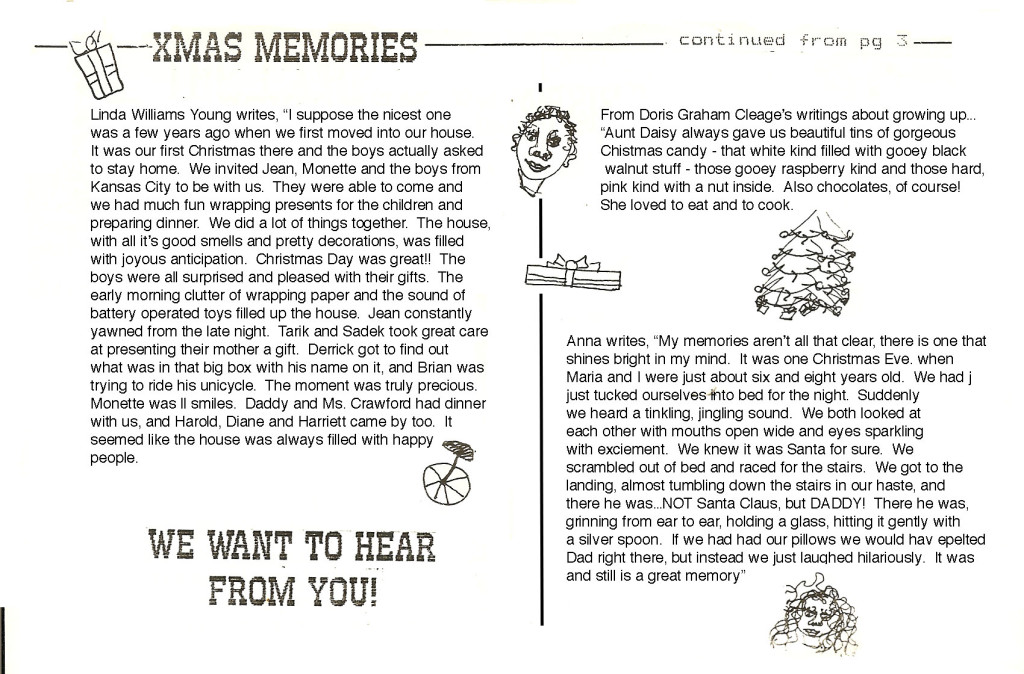
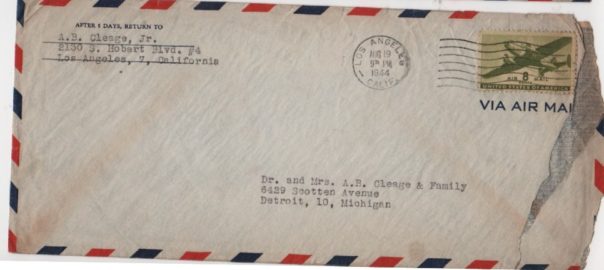
This is another letter that my father wrote home to Detroit from Los Angeles when he was studying film in 1944. The photograph of my mother putting a hem in her skirt is also from August, 1944. I’m not sure if this picture was enclosed with this letter.
231 South Hobart Blvd. #4
Los Angeles, 7, California
August 18, 1944
Hi Folks:
Its Friday afternoon and I just got home from school, and I thought I’d drop you-all a note on the state of the nation. My “little” wife is still working. She gets off about five-thirty and comes home by way of the grocery store. Everything is about the same as usual. We’re still at large (out of the poor-house)…but I’ll have to find something to do pretty quick if we’re planning to stay that-a-way! I’m “dickering” with the Los Angeles Church Federation for a “position”. The “boss-Man” is out of town but I’ve filed an application and we’ll discuss the matter further when he gets back in September. It would be a pretty-good job if I can get it…sort of Negro field-worker for the Federation, co-ordinating the community work of the Negro churches… recruiting and training volunteers and organizing programs and clubs and groups and what-have-you. I’ve also applied to the Negro Community-Center, just-in-case.
On the way to school this morning a man picked me up in the safety-zone (big fine looking red-faced white man) in a Packard from here down town…and we got to bulling each other, and it turned out that he’s the Director of Audio-Visual Education for the Los Angeles Public Schools. Of course he was very happy to meet a real authority in the field…and invited me down to his office to see the experimental work the School System is doing in Moving-picture production. I’ll go down as soon as I can and see what them there “amateurs” are a trying to do.
School is going along fine…(no grades yet, of course!) Me and the Dean of the School of Religion are having a little long-distance controversy through his secretary. He thinks I ought to take half of my work in RELIGION…and I think I ought to take all (or almost all) in Cinema. He has an ace in the hole, however, in as much as I’m registered under the School of Religion and therefore pay only the special fees (Fellowships in religion make up the difference) …However, I’m not going to take half of my work in religion in as much as the religion courses will not contribute to what I’m trying to do!
SPECIAL NOTE TO LOUIS: If he makes me pay up the REGULAR REGISTRATION FEES I’ll have to wire you for a small loan of $100.00 or so until I can work long enough to pay it back. I think we can “arrange the difference of opinion” without such a drastic step… but with the good-white-folks you can never tell…especially preachers. My wife will divorce me if I have to borrow…but I aint no sentimentalist myself…and so I’m a warnin’ you.
How’s the farm going? How’s Mama getting along? I hear that “Racial-tension” in Detroit is a thing of the past! We’re getting ready to have a riot here…The FEPC has ordered the Street Railways to hire and upgrade Negroes immediately! Maybe I can get a “Riot-Movie”.
Here are some “snaps”- Did you get the ones we sent from San Francisco – I don’t think you ever mentioned them.

I am the first daughter, born during a thunderstorm in the middle of the night.
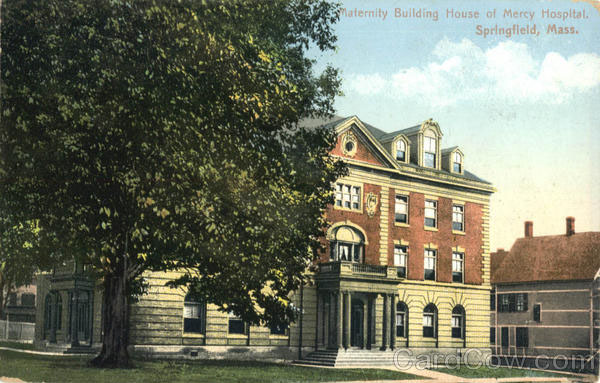 I was born at Mercy Hospital in Springfield, Massachusetts, August 30, 1946. My parents arrived there the fall of 1945 when my father was chosen as Pastor of St. John’s Congregational Church. My mother was 23 and my father was 33. Although I was one of the people present in the delivery room, I’ve had to rely on the memories my mother shared with me.
I was born at Mercy Hospital in Springfield, Massachusetts, August 30, 1946. My parents arrived there the fall of 1945 when my father was chosen as Pastor of St. John’s Congregational Church. My mother was 23 and my father was 33. Although I was one of the people present in the delivery room, I’ve had to rely on the memories my mother shared with me. 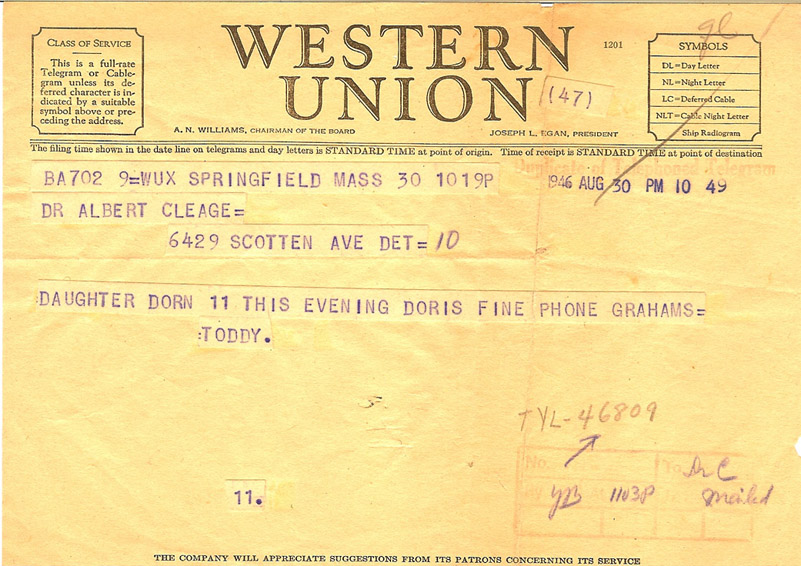 My mother was given a wiff of ether as I crowned so she did not see me born. I had a head full of dark hair, enough that a nurse pulled it up into a little pony tail and tied a ribbon around it. The nurse told my mother that all of the dark hair was going to come out and I would have blond hair. She was right. All of that fell out and I had a small amount of blond hair. It would be years before there was enough to pull up in a ribbon. My eyes were blue/gray.
My mother was given a wiff of ether as I crowned so she did not see me born. I had a head full of dark hair, enough that a nurse pulled it up into a little pony tail and tied a ribbon around it. The nurse told my mother that all of the dark hair was going to come out and I would have blond hair. She was right. All of that fell out and I had a small amount of blond hair. It would be years before there was enough to pull up in a ribbon. My eyes were blue/gray.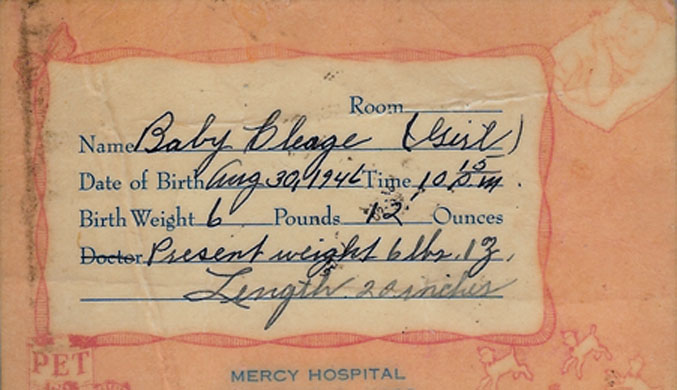 My mother said that she was unable to breast feed me because she had no milk. I always felt very sad about this, not so much for me, but because I think that if I could have gone back in time with what I learned about nursing when my own babies were born, I could have helped her make a go of it. After ten days in the hospital, we went home. A member of the church, Reginald Funn, drove us to the parsonage because my parents didn’t have a car until I was 8 years old. Looking at my baby book, there were many visitors and gifts from friends, family and neighbors.
My mother said that she was unable to breast feed me because she had no milk. I always felt very sad about this, not so much for me, but because I think that if I could have gone back in time with what I learned about nursing when my own babies were born, I could have helped her make a go of it. After ten days in the hospital, we went home. A member of the church, Reginald Funn, drove us to the parsonage because my parents didn’t have a car until I was 8 years old. Looking at my baby book, there were many visitors and gifts from friends, family and neighbors.
Both of my grandmothers came from Detroit to help out. I was the first grandchild on my father’s side and the second on my mother’s side. My maternal grandmother, Fannie Graham, had a cold so she was regulated to washing clothes and cooking and other duties that kept her away from me so I would not catch her cold. My Grandmother Pearl Cleage had the care of me. My mother said that her pediatrician told her not to give me any water because it would make me drink less milk. Below is a letter my Grandmother Pearl wrote home about it below. Poor baby me.
In this letter, Toddy was my father’s family nickname. Louis was his MD brother. Barbara is my father’s oldest sister, left in charge while her mother was in Springfield.
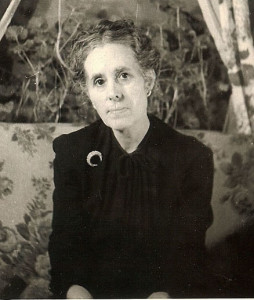 210 King St
210 King St
Springfield Mass
Monday 23/46
Dear Barbara,
How are you? How are Gladys and Daddy and the boys?
We have had a time with this baby, the first nights and all last week Toddy and I were up all night each night! She cried and cried and screamed until she would be exhausted and so was I! Last night and today, so far, she has slept a lot better. Before we talked with Louis I’ve put her feedings 3 hours apart, just last night because she acted like she would burst open, with crying. This a.m. we got the Bio Lac and are giving her water regularly too and she is acting 100% better!
When I would have given her water before, they told me her stomach would not hold it and food and had me stop her feeding at about 3 ounces, for fear she couldn’t hold it all, not to feed her too much, and Kris just starving to pieces! I did as they told me until I said I was going to talk to Louis because I had never seen a baby eat and be dry and then just act like she was starving to death and never sleep!
***************
I regret that nobody took any photographs of little me with either of my grandmothers.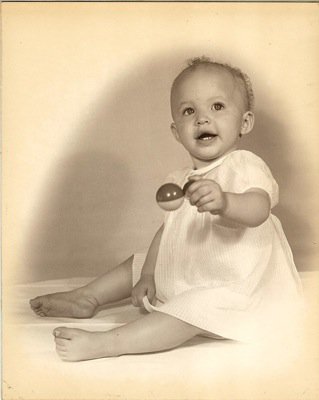
Two excerpts from a letter my father wrote home in January. Actually, I did look like him, and more and more so as the years passed until now, if he were still here, we could pass as twins.
January 1, 1947
“…Doris and Kris welcomed in the New Year in their own inimitable way…at home. They got out only once during the holiday…on Christmas day we went to a Turkey dinner at the Funns. We had a tree “for Kris (and Doris) which Kris ignored…disdainfully. Our double-octet went out caroling to the hospital Christmas eve (yes Louis, for the white folks) and came back by and sang carols for us afterwards. Kris listened to them with her usual disdain…and they all agreed that “she is the most sophisticated looking baby they had ever seen!”
“…. She loves to play from 2 until 4 a.m. She had the sniffles for part of one day…but seems to have so far avoided a serious cold…even with us and the rest of Springfield down with Flu, Grip and everything else… She weigh 11:4 (last week) She’s learned to yell or scream or something…and will scream at you for hours if you’ll scream back (Just like M-V) and seems to love it…then after an hour or so…her screaming will shift into a wild crying…and then she must be picked up and played with for several more hours…SHE LOVES ATTENTION…No, mama, we do not let her cry…and her navel seems to be doing O.K. AND SHE DOES NOT LOOK LIKE ME! All reports not withstanding!”
March 18, 1947 – from a letter to my father’s sister, Anna by my mother.
“Kris (with her 2 teeth) says anytime for you all laughing at her bald head – I fear it’ll be covered all too soon with first one thing and then another.”
__________________
March 31, 1947 – From a letter to the Cleage’s from a friend of my parents in Springfield
“Last night at home, Kris had quite a time with her teeth and I think Doris was quite anxious. Reverend Cleage had to leave for Loring before Kris really let go so he didn’t know how much the baby suffered. I know it won’t last long, tho’ for mother says some teeth give more pain than others, but it is soon over with.”
__________________
From an April 7, 1947 letter my father sister Gladys wrote home while visiting Springfield.
“Kris is no good- but cute! Head’s not like the picture – kids! I definitely have no way with babies – I have truly lived!”
________________________
June 29, 1947 (from a letter by my father’s visiting sister, Anna)
“… Doris went to a reception today and I watched Kris. I tricked her, I played some soft music on the radio and waltzed around the room with her a few times, then eased into a rocking chair and first thing she knew she was asleep – so I put her in her crib and the next thing she knew Doris was home waking her to feed her.”
_______________________
I seem to have done fine, as you can see below, with my dirty bare feet I am sitting on the porch with my father’s father and my parents. I started walking at 9 months and my first words were – “Bow wow.” soon followed by “Some manners if you please!” My mother said that people didn’t usually understand what I was saying when I came out with that.
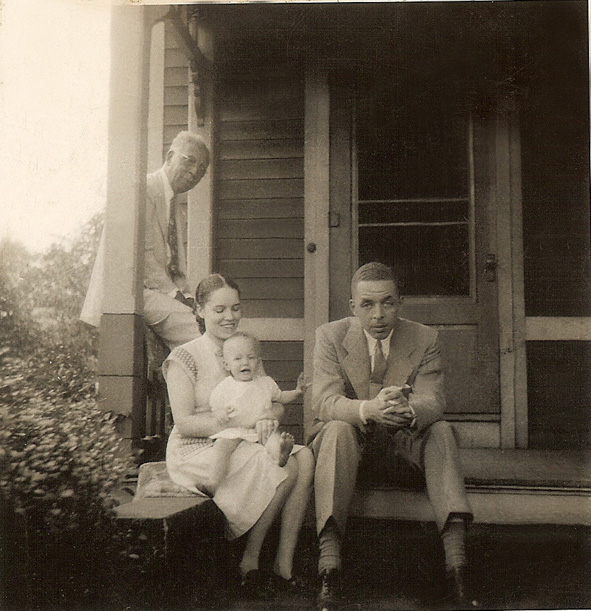
You can read the front page of the Springfield Republican for the day I was born here.

I remember several cookouts in my grandmother Cleage’s backyard. There was the one where the tables were set up right in front of the gate that looked out on the street. There was some sort of minor argument about this. Afterwards, my sister and I called any sort of family argument a “cookout.” On that occasion Grace Lee Boggs dropped by, not for the cookout, but for some political reason, dating it in the 1960s.
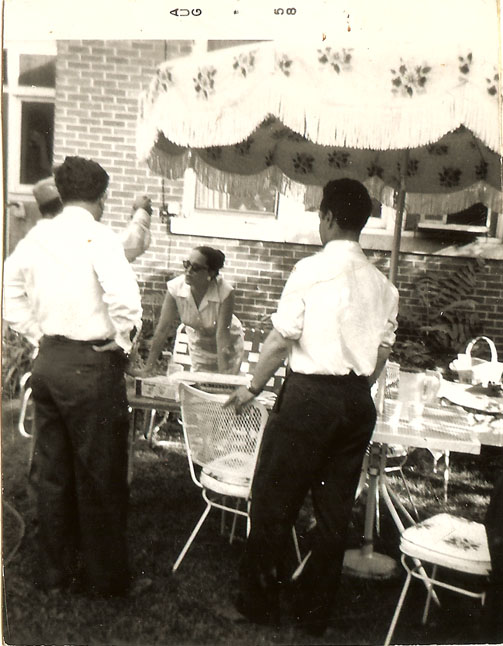
The cookout pictured below took place during the summer of 1958. My uncle Louis bought a big blue plastic swimming pool that took up most of the cement part of the yard. I don’t remember it being there any other summer. Once, my sister Pearl was drowning when my uncle Henry noticed her on the bottom of the pool, reached down and pulled her out. I don’t know why she didn’t stand up. She was 9 and I turned 12 that August. The bushes on the fence were full of tiny, pink roses during the season. Those are still my favorite roses.
Pearl remembers: I am still mystified as to why I didn’t just put my feet down. I don’t remember being at the bottom of the pool. I remember going down and splashing my way back up to the top and not being able to stay with my head above water. and then Henry came over and grabbed me and pulled me up and out. who knows what was going on? and we had those little plastic life preservers, too. how deep was the damn thing anyway?
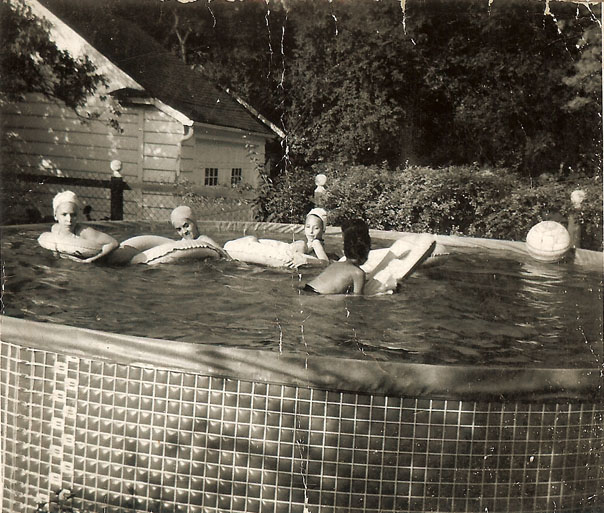
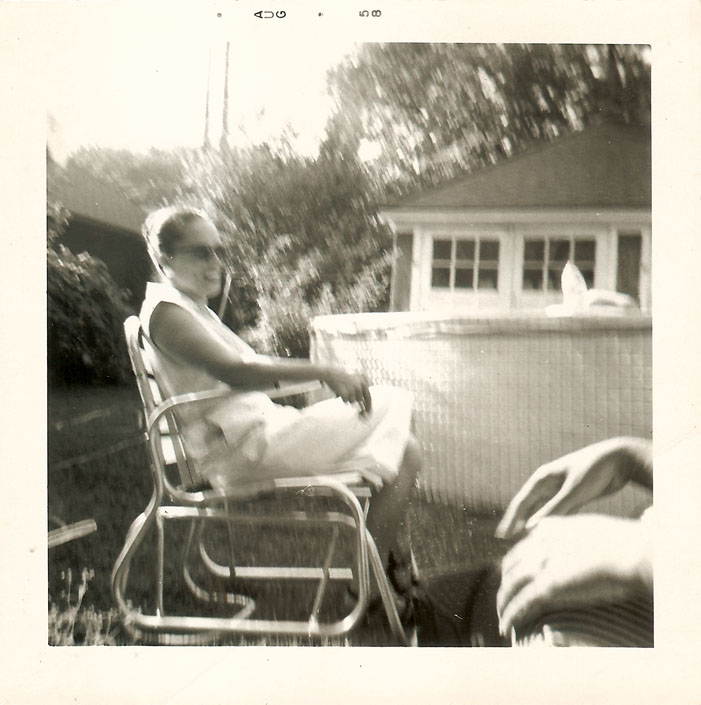

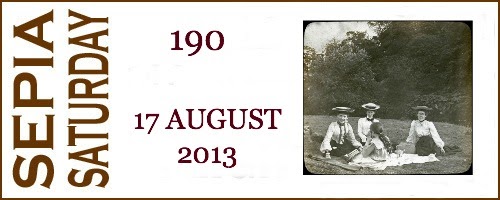

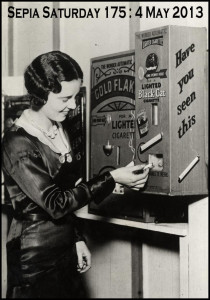
I always liked this photograph of my mother in 1952, holding her cigarette and making a point. She looks so sure of what she’s saying. I assume my father took the photo. It was taken in the living room of the parsonage at 2212 Atkinson, while my father was Pastor of St. Mark’s United Presbyterian Church on 12th and Atkinson. Through the door you can see the kitchen. I remember the tank of guppies, always needing to be cleaned, that stood on a counter under the window. There is the long legged television with Picasso’s “Two Clowns” in the antenna, a leatherette double frame with spaces for pictures and wires attached. When the TV stopped working Mr. Rice, the repairman, came with his big metal toolbox, full of tubes and testers to find the burned out tube and change it. I can’t remember when we no longer needed tubes changed or when we got our next television or what it looked like or when my mother stopped smoking.
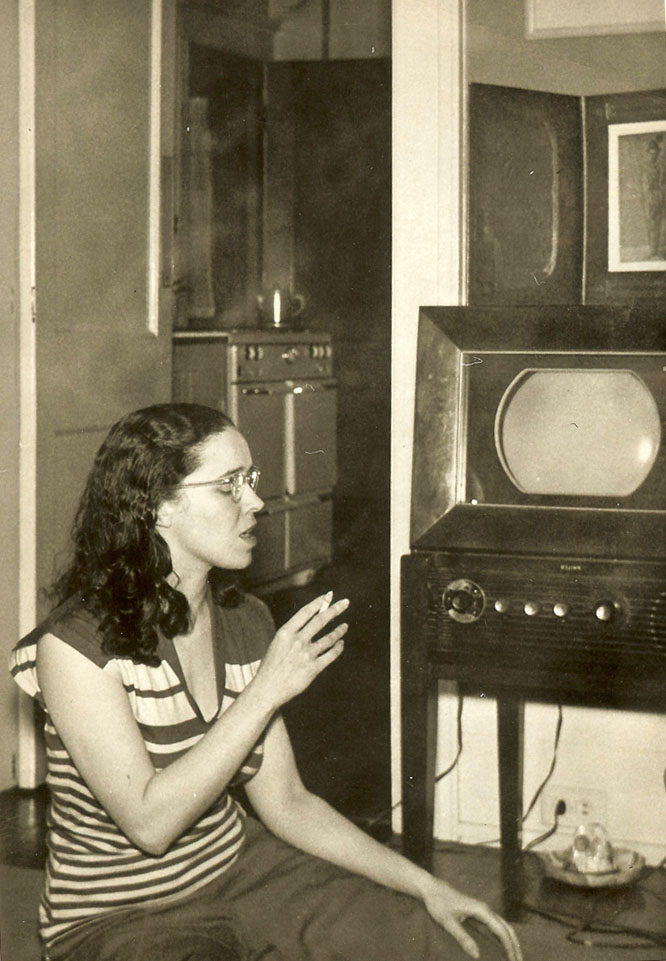
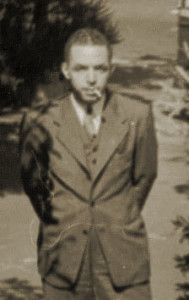
From a letter my father wrote home to Detroit from Los Angeles, CA. on December 4, 1944. Photo by my mother.
“Has the Cigarette shortage hit the hinterland as yet? Here we can’t get any most of the time. I manage to get three or four packages a week with the frantic cooperation of Doris and a boy at school who works where he can get hold of some occasionally. At school the Student-Union sells them every once in a while. Then we all line up for blocks until the seventy-five or one hundred packages are gone. Profound commentary on modern life if anyone has the time to figure out just what is is. Drug stores and Groceries just laugh at you when you ask for Cigarettes…”HA HA HA… Listen Folks, he wants cigarettes…HA HA.”
To want to read more about Cigarettes and where they went during WW2, follow this link Smoke ‘Em if You Got ‘Em.
And here is the recording of Sarah Vaughn singing “No Smoke Blues”. Thank you John J. for mentioning this.
This is the 23rd post in the February Photo Collage Festival and the Family History Writing Challenge. The photograph for today is a corner of our living room at 5397 Oregon in Detroit. My mother and I are reading the newspaper. I was 16.
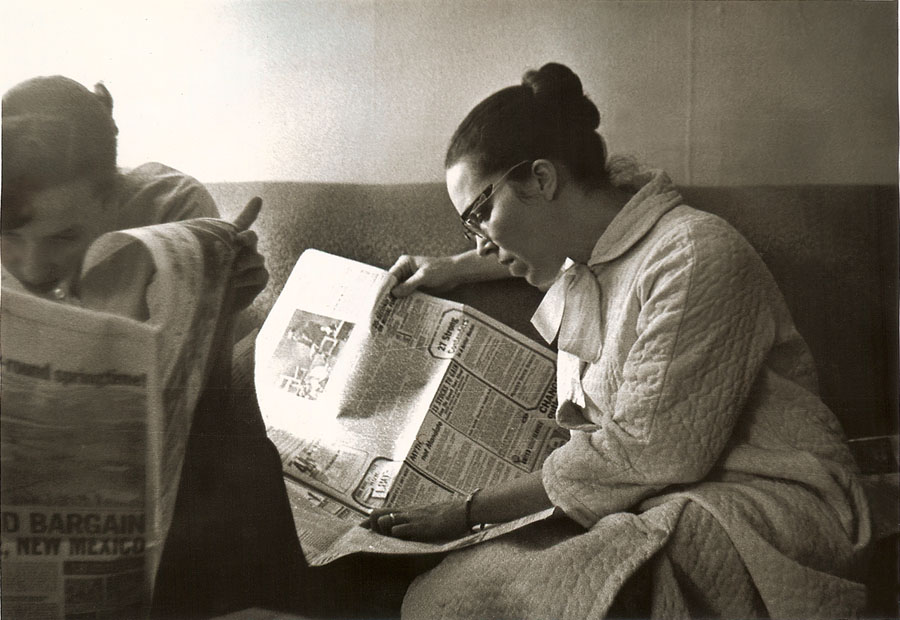 It is probably Sunday, because my mother is still in her bathrobe. And who reads the Saturday paper so avidly? I think the bathrobe was light pink, but I’m not sure. The couch was an old one that my mother brought from Sally and Ivy’s mother when we lived on Calvert. They moved out to Southfield, near the zoo, and bought new furniture. I remember going to visit once and hearing the lions roar.
It is probably Sunday, because my mother is still in her bathrobe. And who reads the Saturday paper so avidly? I think the bathrobe was light pink, but I’m not sure. The couch was an old one that my mother brought from Sally and Ivy’s mother when we lived on Calvert. They moved out to Southfield, near the zoo, and bought new furniture. I remember going to visit once and hearing the lions roar.
The couch was old. My mother had a slip cover made. It was blue with a blue design. I patched it once, in a fit of fix-it-up. It has been a long time since I have read a newspaper offline. I wonder what we were reading about.
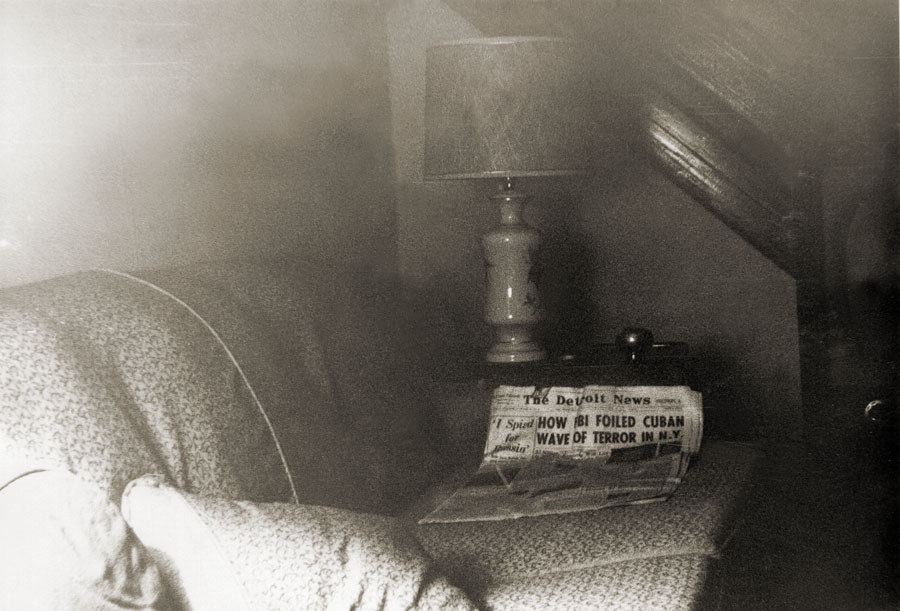
There was an end table with a lamp and a brass ash tray. Both my mother and Henry smoked. The table had a fake leather top and a big drawer. One of my daughters has that table now. The lamp was white with red flowers and green leaves painted on it. There were gold lines at the top and base. The old television, in a wood cabinet ,was still working. Later it died and for awhile there was a smaller TV, that worked, sitting on top of it.
The walls were beige. When we moved in, they were covered with wall paper. As soon as she could afford it, my mother had Mrs. Bruce’s brother come and paint it a clean, beige color. There is no art work above the couch in this photograph. When I graduated from high school and began studying art at Wayne State University, my mother would tack one of my drawings up on the wall. Later on she had me frame them for her, badly. I never could cut the mats right. You can’t see the rug here but it was a faded wine colored pattern. It was wall to wall and never replaced while we lived there.

This is the 23rd post in the February Photo Collage Festival and the Family History Writing Challenge. The photograph for today is of a corner of the living room in my parents apartment in San Francisco. It was 1944.
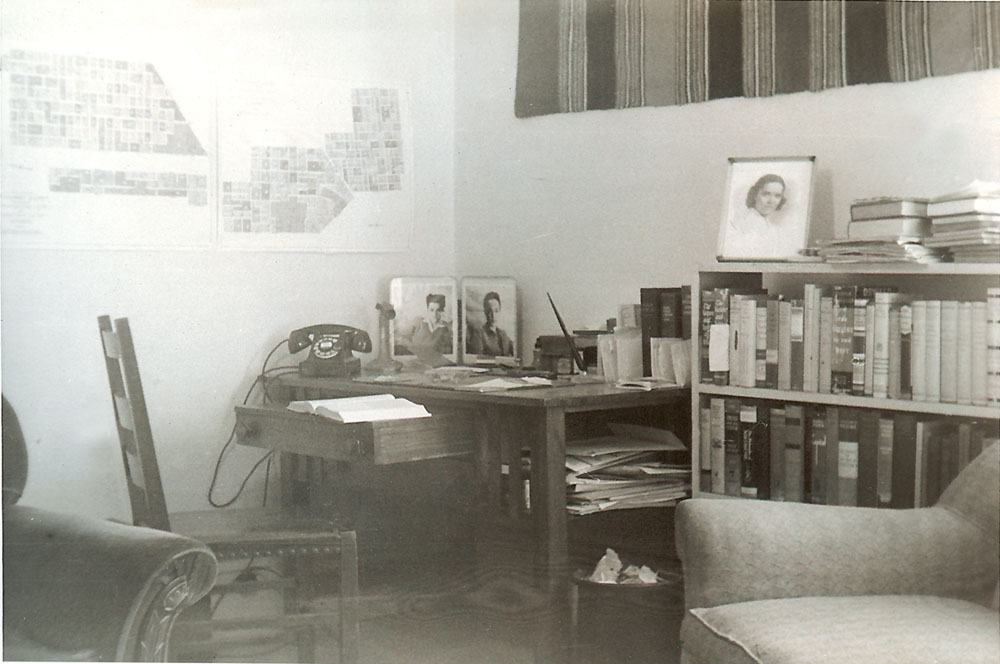
My parents, Albert B. Cleage Jr and Doris Graham, were married in Detroit on November 17, 1943. They left immediately after the ceremony for Lexington, Kentucky, where my father had accepted a call from Chandler Memorial Congregational Church. They were there only two months when he accepted an interim pastorship at the new, experimental San Francisco Church for the Fellowship of All Peoples. He served from January of 1944 through June of the same year. The captions under the photographs are taken from what my parents wrote on the back when they sent the pictures back home to their families.
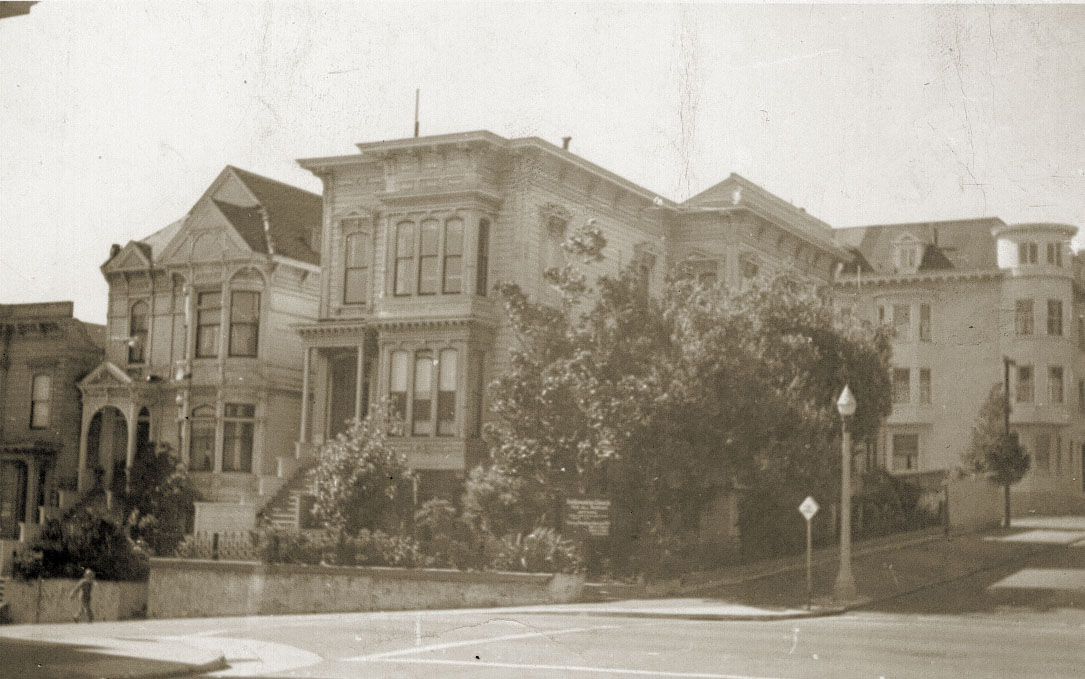
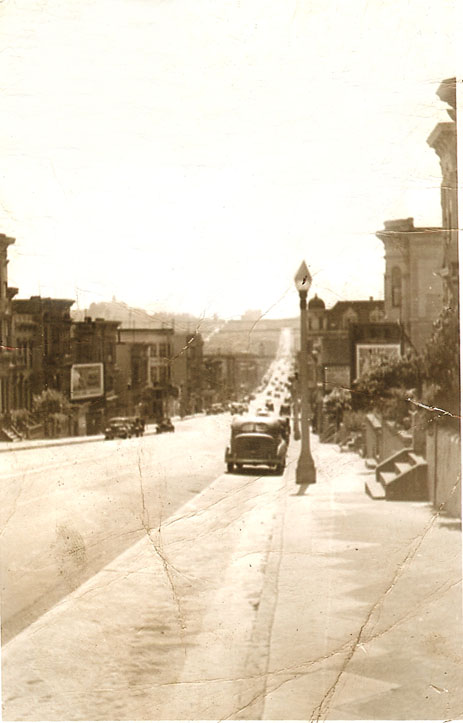
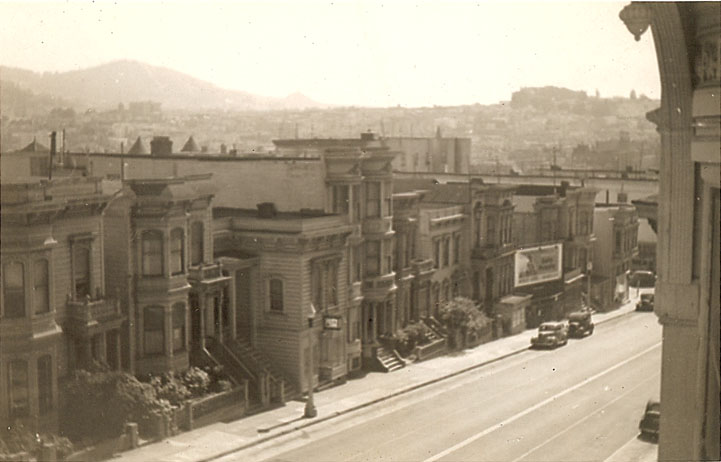
Following is an excerpt from a biography of my father, about his time in San Francisco. I wish I had the box of letters I know existed from those six months.
“Cleage does not remember his work with the famous Fellowship Church of All Peoples with any fondness. The new congregation, which had about fifty members when he was there, was a contrived, artificial affair, he says. ‘An Interracial church is a monstrosity and an impossibility,’ he said. ‘The whites who came, came as sort of missionaries. They wanted to do something meaningful, but this was not really their church. The blacks regarded it as experimental too, or were brainwashed to think that it was something superior.’ He called his white counterpart, Dr. Fisk, ‘well-meaning,’ and said Fisk thought he (Fisk) was doing a great work, but had no understanding of tension and power. He felt the Lord looked in favor on this work, and any whites that joined him were headed for glory. He hated to have problems mentioned. Problems included the property left deteriorating after the Japanese were moved out, and the boilermakers’ union ‘which set up separate auxiliary units for black so they could discontinue the units after the war.’ Cleage joined in with NAACP efforts to get at these injustices. He was told he could stay at the Fellowship of All Peoples if he wanted to, and he said ‘they were nice people, but it did not seem to me it was a significant ministry.’ About Fisk, he said, ‘He talked about the glorious fellowship washed in the blood of the Lamb; I talked about hell on the alternate Sundays. He felt upset about my preaching, but he didn’t want to raise racial tension in his heaven.'”
From Hiley Ward, Prophet of the Black Nation. (Piladelphis: Pilgrim Press, 1969), p. 55.
________________________
You can see a newspaper clipping of my parents and a very short post about their time in San Francisco here Newspaper Clipping of My Parents. Soon after July 1, my parents moved to Los Angeles, where my father studied film making for a year before he was called to pastor St. John’s Congregational Church in Springfield, Massachusetts.
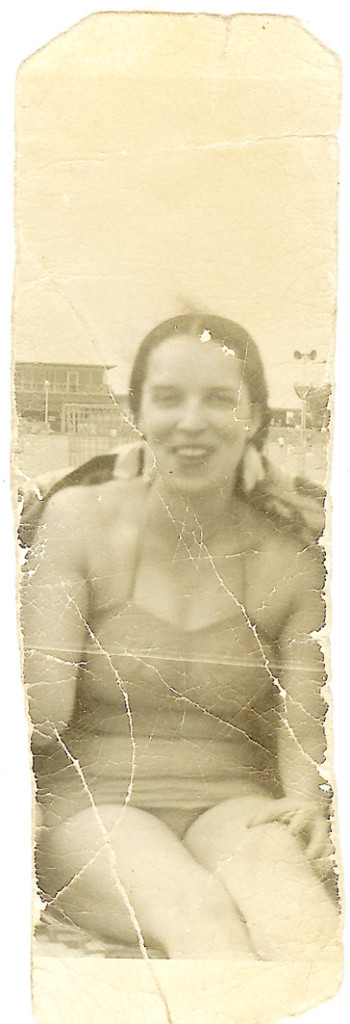 Here is my mother in a fragment of a photograph. I don’t recognize the beach. We can’t see who is on either side of her. Her hair is long and parted in the middle. Ribbons tie it on each side. A blanket seems to be behind her shoulders but not resting on them. Over her left shoulder are some people and loudspeakers on a pole. Over her right shoulder is a building, a jungle gym and a light on a pole.
Here is my mother in a fragment of a photograph. I don’t recognize the beach. We can’t see who is on either side of her. Her hair is long and parted in the middle. Ribbons tie it on each side. A blanket seems to be behind her shoulders but not resting on them. Over her left shoulder are some people and loudspeakers on a pole. Over her right shoulder is a building, a jungle gym and a light on a pole.
I have other photos of my mother in bathing suits but none look like this one. She looks young, in her early 20s. I was born when she was 23, in 1946. Was it before or after I was born? The expression on her face reminds me of this photograph taken in Los Angeles in 1944. So long ago. All of my children are older than she was then.
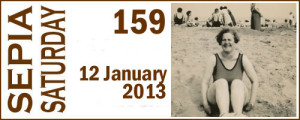
I was inspired to post this photo by a post on Between the Gate Posts “The Lady Wears The Hat“. It’s a beautiful photograph of her aunt.